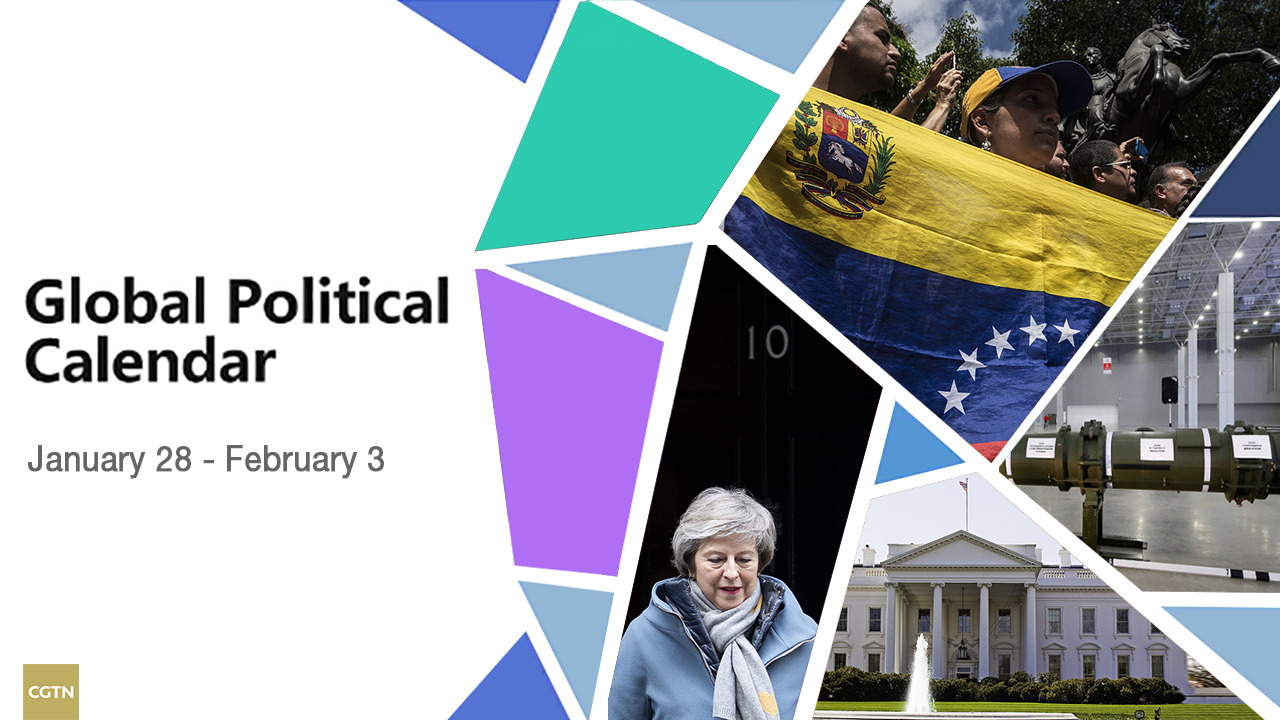
World
18:06, 27-Jan-2019
Global Political Calendar: Brexit, INF Treaty, Venezuela crisis
By Duan Fengyuan

British Prime Minister Theresa May returns to the House of Commons for a vote again, the U.S. probably begins to withdraw from the Intermediate-Range Nuclear Forces Treaty (INF Treaty) with Russia, the U.S. federal government starts running again with border wall issues unresolved, the date of U.S. President Donald Trump's State of the Union address remains unclear, and Venezuela's political turmoil is likely to continue.
Brexit to be delayed?
The next Brexit vote is scheduled for Tuesday to set out the next steps in the Brexit process. Before this vote, a withdrawal deal May negotiated with the EU was rejected by MPs with a historic margin of 432 votes to 202, and then a new "Plan B" was announced.
May said earlier that she was focused on an "insurance policy" designed to avoid a hard border on the island of Ireland. But Labour leader Jeremy Corbyn said the prime minister was in denial about the level of opposition to her deal.
MPs are trying to change the course of Brexit in a number of ways, such as amendments aiming to stop a no-deal Brexit and to extend the March 29 deadline for leaving the EU.
U.S., Russia, and INF Treaty
U.S. Secretary of State Mike Pompeo set a 60-day deadline in December for Russia to stop "cheating" on the INF Treaty.
With the February 2 deadline approaching, there are few signs of a positive outcome: talks between the U.S. and Russia were not fruitful, Russia reiterated its full compliance with the treaty, meeting of the NATO-Russia Council in Brussels failed to make progress, and Russian President Vladimir Putin threatened to develop nuclear missiles banned under the treaty if it is scrapped.
The INF Treaty, signed between the U.S. and the Soviet Union in 1987, bans all land-based cruise missiles with a range between 500 and 5,500 kilometers.
End of shutdown, beginning of State of Union?
Trump temporarily ended the longest federal government shutdown in U.S. history.
As for Trump's demand for 5.7 billion U.S. dollars to fund a border wall with Mexico, the White House prepared an emergency declaration that the president could issue as a way to circumvent the Congress if lawmakers do not provide the funding.
Trump also promised to give his annual State of the Union address after the government reopens without saying that the date will be January 29 as planned.
Eight-day ultimatum
The Trump administration called for Venezuelan President Nicolas Maduro to step down after recognizing Juan Guaido, chief of the country's opposition-led National Assembly, as its interim leader, which makes Venezuela further plunged into a political turmoil.
After Washington's shocking announcement, Venezuela cut diplomatic ties with the U.S. and demanded to shut the U.S. embassy and consulates in the country, asking U.S. diplomats to leave within 72 hours.
Among various reactions on the crisis in Venezuela, several Western countries, such as Germany and Spain, said they will recognize Guaido as the president of Venezuela if elections are not called within eight days from January 26.
China has maintained the principle of non-interference in the internal affairs of other countries, and Iran has voiced its support for the legitimate government of Venezuela.
Day-by-day
Monday: French President Emmanuel Macron visits Egypt, and Russian Foreign Minister Sergei Lavrov meets Kazakhstan Foreign Minister Beibut Atamkulov in Moscow.
Tuesday: UK legislators debate and vote on the next steps of the withdrawal agreement, Iraqi Foreign Minister Mohammed Ali Al-Hakim starts his two-day visit to Moscow, and Trump is likely to deliver his State of the Union address in the Capitol.
Wednesday: Chinese Vice Premier Liu He starts a two-day visit to the U.S. for trade talks, the eighth Beijing P5 conference is held, Spanish Prime Minister Pedro Sanchez begins a two-day official visit to Mexico and meets Mexican President Andres Manuel Lopez Obrador, and Russian Foreign Minister Sergei Lavrov meets his Iraqi counterpart Mohammed al-Hakim in Moscow.
Thursday: Two-day informal meeting of defense ministers of the EU member states ends in Bucharest.
Friday: The 20th East African Community (EAC) Summit is held in Arusha, Tanzania, EU's high representative for Foreign Affairs Federica Mogherini and Romanian Foreign Minister Teodor Melescanu hold a news conference at the end of an informal meeting of EU foreign ministers in Bucharest.
Saturday: The U.S. probably begins its withdrawal from the Intermediate-Range Nuclear Forces Treaty with Russia.
Sunday: EI Salvador's presidential election is held, and it is the deadline of the call from Germany, Spain, France, and the UK for announcing a fresh election in Venezuela.

SITEMAP
Copyright © 2018 CGTN. Beijing ICP prepared NO.16065310-3
Copyright © 2018 CGTN. Beijing ICP prepared NO.16065310-3